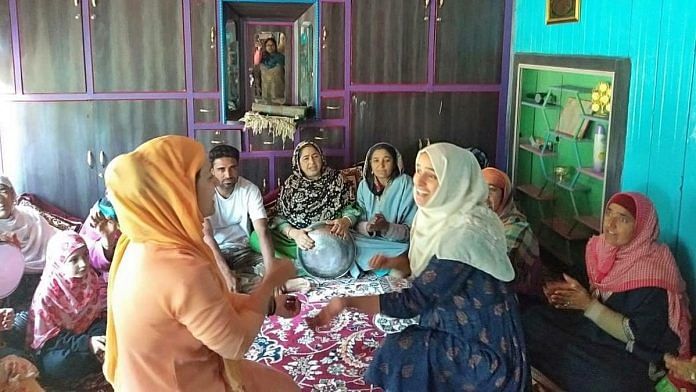Gurez (Bandipora): The villages of Izmarg and Bajrang sit side by side at an altitude of over 10,000 feet near the Line of Control, which slices through Kashmir to divide it between India and Pakistan. But they seemed to inhabit different worlds this past week.
In Bajrang, residents were hard at work rebuilding houses gutted in shelling from Pakistan, the spectre of Kashmir’s fierce winter closing in by the day and lending an urgency to the task.
Izmarg, meanwhile, was busy preparing for twin weddings of two brothers, trying to find a sliver of normalcy amid the troubled phase the Valley is going through.
Even so, through the song, dance and festivities of Izmarg, and the rattle of bricks in Bajrang, a similar ambivalence rang out as ThePrint asked them about the scrapping of Article 370.
The special status meant little to a people without jobs, who find themselves cut off from the rest of the world every winter. Nothing has changed for them over the past few decades. Nothing will change now, they say.
Also Read: ‘Free Kashmir’ lights up Times Square ahead of Modi, Imran UN address in New York
‘Racing against time’
When this reporter caught up with him, Farooq Ahmad Choupan, a Bajrang resident in his late 30s, was frantically at work, removing burnt debris from what used to be his home until a month ago.
The house, one of 32 in the village located at Gurez in Bandipora district, is completely flattened. It caught fire on the morning of 27 August, after it was hit by incessant shelling from Pakistan.
In all, 13 houses were destroyed and one villager was injured in the shelling.
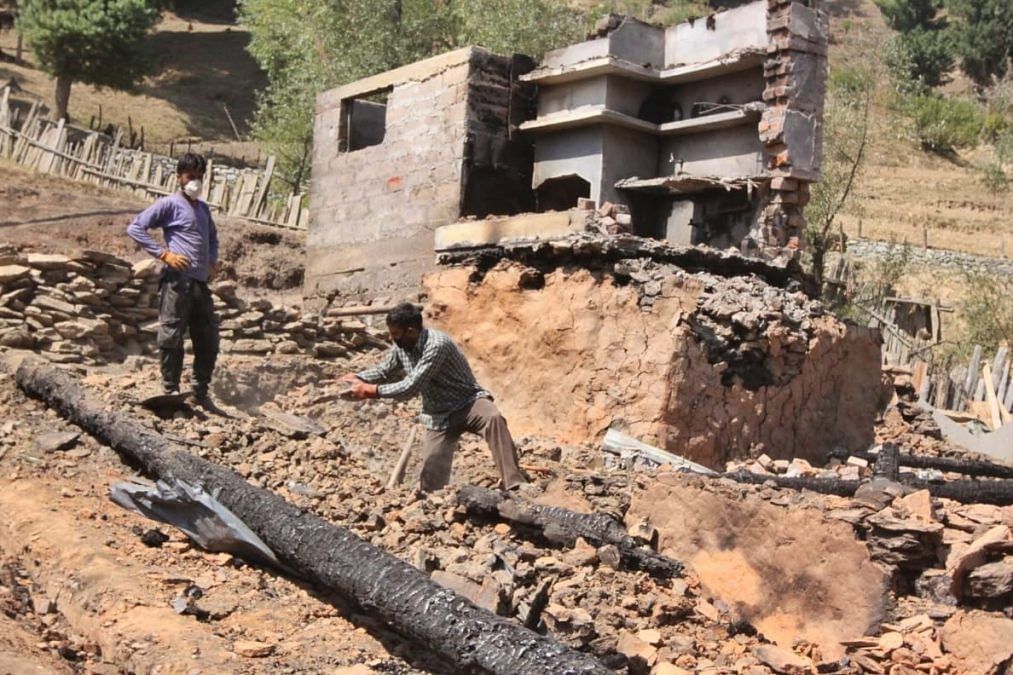
An Army man posted at the Kanzalwan check post in Gurez said shelling from Pakistan had intensified in the last month-and-a-half. Civilians were affected, he added, as they were in the direct line of fire.
Farooq and his fellow villagers have been working from dawn to dusk to complete the houses before the winter sets in with its freezing temperatures and blankets of snow, blocking roads and crippling movement.
“We are racing against time,” Farooq said. “I don’t think I will be able to complete this in a month’s time. I don’t have any idea where I will stay with my family of six this winter.”
‘Our condition will remain the same’
Bajrang village has a population of approximately 250, most of whom are farm labourers engaged primarily in the cultivation of potatoes and kidney beans (rajma).
Since they lost their home, Farooq and his family have been living in one of the bunkers that are a common sight in border villages familiar with the shelling that follows each ebb in India-Pakistan ties. The 12 other families rendered homeless by the shelling on 27 August, when Pakistan deployed heavy artillery in their onslaught on civilian areas on the Indian side, have been living with neighbours whose houses survived the shelling.
“From November until March, we won’t be able to do any work because of snow,” said Ghulam Hasan Choupan, who also lost his house. “We will start rebuilding once the winter is over.”
Villagers in Bajrang, as well as neighbouring Tarbal, say the revocation of Article 370 has no meaning for them as it is not going to make any difference in their lives.
“We do not have a roof on our head. Will not having Article 370 help me in any way?” said Farooq. “I don’t think so. Our condition will continue to remain the same. The authorities will keep paying lip service from time to time.”
Ghulam added, “We do not have a house now. But it’s the same story for us every winter. Roads remain cut off for five-six months. We are left to fend for ourselves. Many governments have come and gone over the past few years. But we are yet to get an all-weather road.”
In the wake of the 27 August shelling episode, the district administration announced compensation for the families, while the Army chipped in with food items, kerosene, utensils, cooking gas and other essential items.
Villagers concede that the rations provided by the Army have been of great help, but are worried that it will not be enough for the winter.
Also Read: After scrapping of Article 370, Shias in Kashmir are in a state of relief and caution
‘We thought a war had broken out’
Now used to the desolation every winter brings, villagers say they start stocking up on rations months in advance. They had done so this year as well, only for the stocks to get pulverised in the shelling from Pakistan.
“But all our rations got burnt in the fire. It is not possible to stock up for five months again,” said Bakti Begum, 65, another of Bajrang’s homeless. “It takes time. From November onwards, our movement will get restricted because of the weather. I don’t know what I am going to do.”
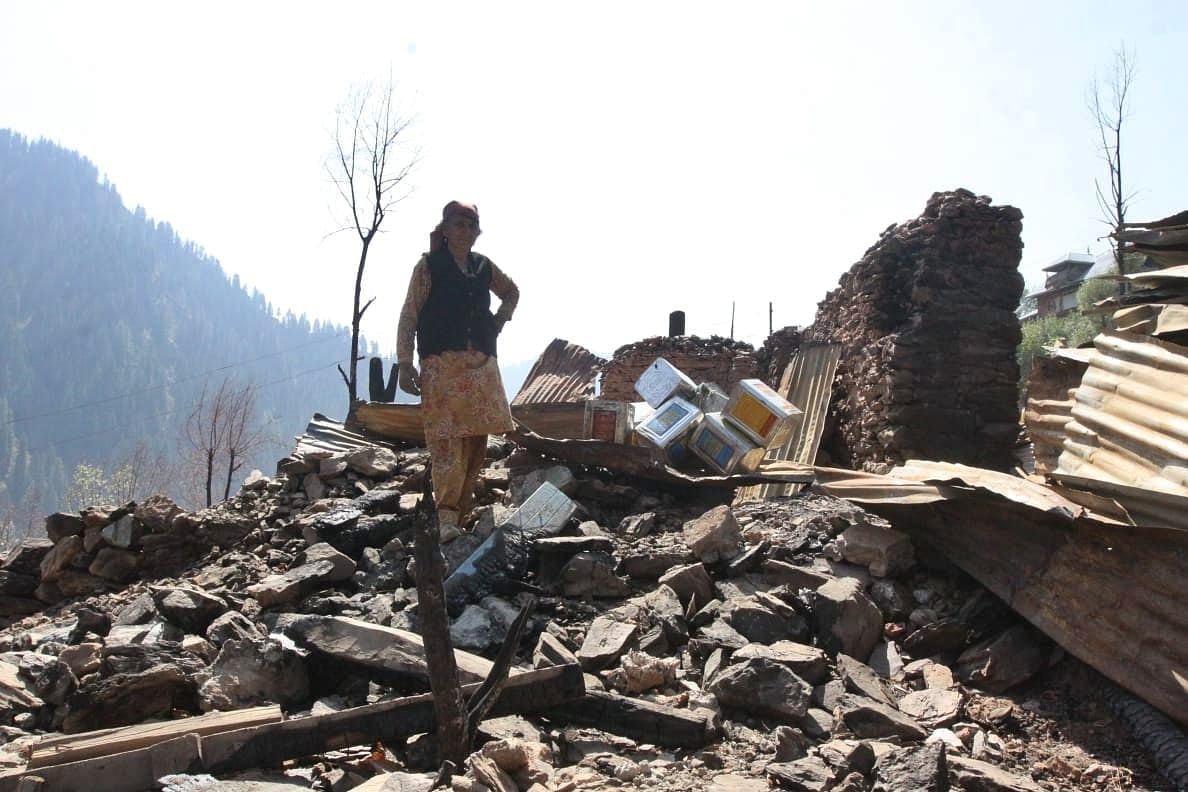
Tahira Begum, a native of West Bengal’s Howrah district, came to Bajrang as a bride four years ago. The morning of 27 August, she said, was the first time since that she felt like going back to Bengal, for good.
“I have never experienced anything like this before,” Tahira added, as she described the chaos of that day. “When we heard sounds of firing around 10.30 am, we ran towards the bunker,” she said. “We thought war has broken out.”
Some 30 villagers had squeezed into a small bunker, including Ghulam Hasan. “After some time, we could sense that there is a fire outside. Smoke was streaming into the bunker. I stepped out to check, and saw that some of our houses have caught fire,” he said.
Just as he turned back to return to the bunker, a fragment of a mortar shell hit him in his right leg.
By the time help arrived, 13 houses were completely gutted.
The fear he felt that day has kept Surash Choupan, 15, from going to school since then. “I am terrified that I will be hit,” he said.
“It’s like a nightmare. We are always on tenterhooks,” said Tahira. “I keep my year-old son inside the bunker most of the time. We are caught in the firing because we are in between the Indian and Pakistani check posts.”
A song and dance in troubling times
Youngsters in the Ahmad household of Izmarg chatted incessantly as they put up decorations around the house Tuesday.
Every now and then, they broke into an impromptu song and dance, but the matriarch, Khadija Rashid, 50, was visibly worried as she attended to relatives.
This was a day before her youngest sons, Tausif and Mubarak, were to get married in the first wedding Gurez has seen since 5 August, when Article 370 was scrapped and the state of Jammu & Kashmir divided into two union territories.
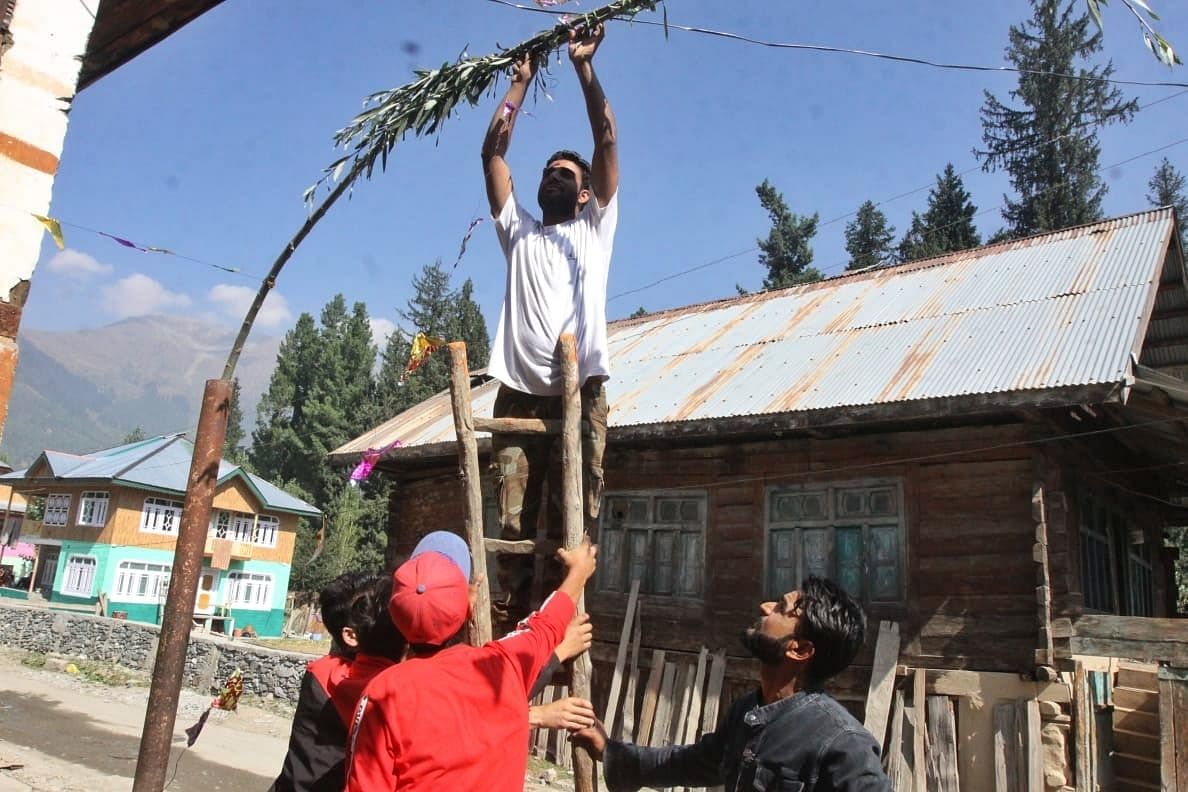
The decision was followed by a complete shutdown in the erstwhile state, with strict restrictions imposed on the movement of people as well as communication services (partially relaxed since). Tensions with Pakistan have intensified as well, and the 13 gutted houses of Bajrang, a couple of kilometres away from Izmarg, serve as a stark, constant reminder of the uncertain times.
“We are living in constant fear that shelling can start anytime from across the border,” said Khadija.
“It’s not the best time to marry off your sons. Only a few weeks ago, heavy shelling destroyed over a dozen houses in the adjoining village,” she added. “But we did not know the situation will turn in this direction when the wedding date was fixed earlier this year.”
Khadija said she had been spending her days praying that nothing untoward happens until the wedding ceremony has been wrapped up. “I am so worried that I can hardly sleep these days,” she added.
Tausif, one of the two grooms, said the idea of postponing the ceremony was discussed by the family.
“Lower-middle-class households like ours need time to arrange the logistics required for a wedding. My brother and I decided to get married on the same day to save the expense,” he added.
“It is not that we did not think of calling it off. But the family elders decided against it as everything had been arranged,” he said. “Most of our relatives have arrived.”
Even as Tausif was speaking, his cousins dragged him to a room where the women of the family sat singing wedding songs. As he took a seat, blushing, his cousins teased him and began dancing to the cheers of the older women.
‘More worried about getting a job’
Amid these festivities, the reality of Kashmir’s current situation was brought home by a family member who advised ThePrint team against recording the singing and dancing.
“Please do not make videos. You will go and show this (to the world) and say things are normal in Kashmir and we will face the brunt here,” said the relative, Zahir Ahmad Lone. “Going through with a wedding ceremony that was fixed much earlier does not mean things are normal.”
A postgraduate from Government Degree College at Bemina, Tausif drives a taxi for a living after failing to get a job better suited to his academic qualification.
His bride also lives in Bandipora. Tausif’s family were set to visit the bride for the ‘mehndi raat’, a custom where young women from the groom’s side go to the bride’s house and apply henna on her hand, after which the entire family will reach her home for the nikah (Islamic wedding ceremony).
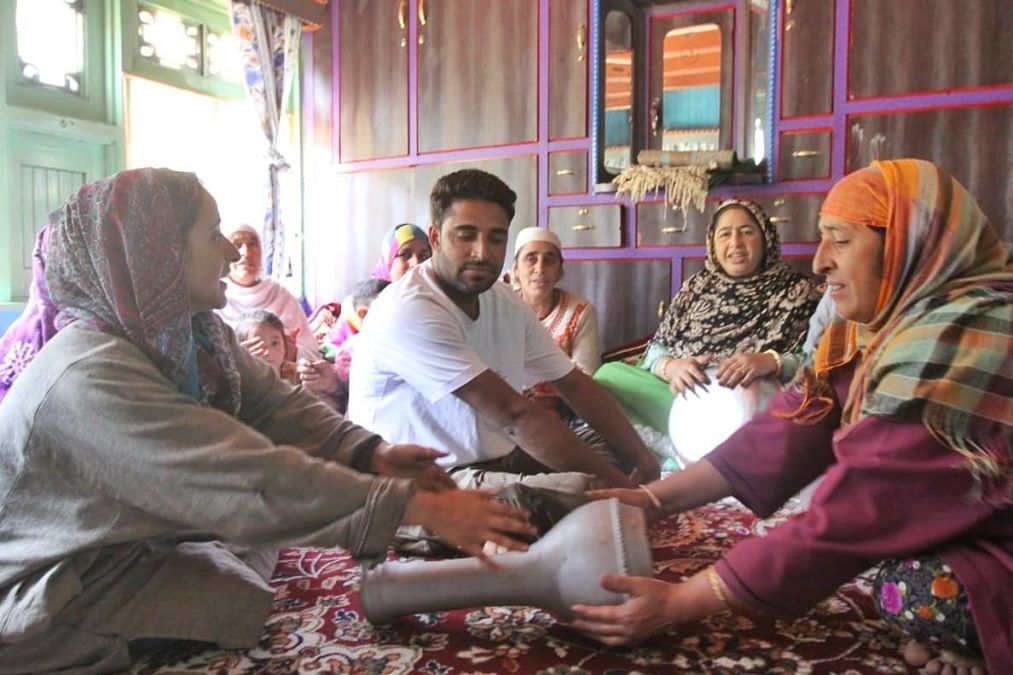
“I know there is a prevailing sense of gloom and doom,” said Roshan Mustafa, 20, Tausif’s cousin. “But this is the first marriage in the family in four years… We can’t help but get excited.”
Roshan said Article 370 was not an issue for him, echoing a sentiment heard in several Gurez villages where residents are more worried about jobs and all-weather roads.
“You will come across a postgraduate in every second house who is sitting idle as there are no jobs,” said Roshan. “Tausif completed his postgraduation in 2014 but is now forced to drive a taxi because he did not get a job.”
Roshan himself is currently studying nursing in Bandipora. “I am not bothered about the revocation of Article370. I am more worried about getting a job next year when I finish my course,” he said.
In Tarabal, another border village, a resident bemoaned the situation they face every winter.
“The roads here, at the best of times, are covered with huge potholes, making movement difficult. It gets worse during the winter,” said Jamsheed Yusuf. “It’s the same story year after year. Just imagine what we have to go through if there is a medical emergency at such a time.”
Asked about this concern, a district administration official said the roads were repaired every summer. “But they get damaged again during the winter because of heavy snow,” the official said.
Also Read: To tackle terrorism in Kashmir, Indian forces need local help – we have snapped that line now


